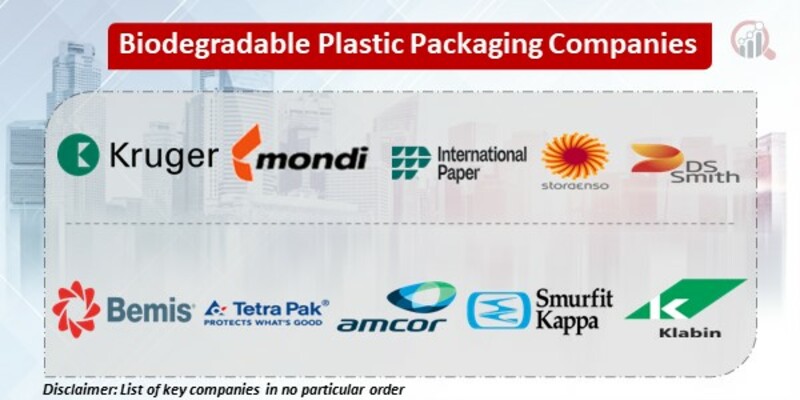Top Industry Leaders in the Biodegradable Plastic Packaging Market
 The biodegradable plastic packaging market, a crucial battleground in the fight against plastic pollution, is a bustling hub of innovation and competition. propelled by environmental concerns, stringent regulations, and consumer demand for sustainable solutions. This dynamic arena sees established players like NatureWorks and Bio-Flex Products Inc. grappling with nimble startups and regional powerhouses, all vying for a larger share of the eco-friendly pie.
The biodegradable plastic packaging market, a crucial battleground in the fight against plastic pollution, is a bustling hub of innovation and competition. propelled by environmental concerns, stringent regulations, and consumer demand for sustainable solutions. This dynamic arena sees established players like NatureWorks and Bio-Flex Products Inc. grappling with nimble startups and regional powerhouses, all vying for a larger share of the eco-friendly pie.
Strategies Adopted by Key Players:
-
Product Diversification: Offering a diverse range of biodegradable packaging materials beyond just polyethylene terephthalate (PET) caters to various applications and needs. Uflex Limited's focus on plant-based polymers and Plantic Technologies' expertise in compostable bioplastics exemplify this approach. -
Embracing Innovation: R&D drives cutting-edge solutions. Ecoveritas Corporation's development of seaweed-based packaging and Evonik Industries' focus on edible coatings for fruits and vegetables showcase this emphasis on innovation. -
Strategic Partnerships and Acquisitions: Collaborations accelerate development and expand reach. The Ellen MacArthur Foundation's New Plastics Economy initiative and Stora Enso's collaboration with Bioplastics Europe to promote sustainable packaging solutions exemplify this strategy. -
Focus on Sustainability: Prioritizing transparency in material sourcing, adhering to composting standards, and promoting biodegradability in all stages of the lifecycle resonates with environmentally conscious consumers and businesses. Novamont's bio-based and compostable materials and BASF's eco-efficiency programs showcase this trend. -
Customer Service and Education: Providing technical support, consultancy services, and educational campaigns about biodegradable packaging benefits builds trust and accelerates market adoption. Bio-Fed's technical support services and Green Dot Bioplastics' consumer education initiatives exemplify this focus.
Factors Influencing Market Share:
-
Technological Advancements: Advancements in material science, biorefineries, and enzyme technologies lead to improved performance, cost-effectiveness, and compostability of biodegradable plastics. Companies offering cutting-edge solutions gain an edge. -
Regulatory Landscape: Evolving regulations around plastic waste disposal, bans on single-use plastics, and compostability standards impact material choices and production processes. Adapting to these regulations swiftly is crucial for success. -
Cost-Effectiveness and Performance: Balancing affordability with high performance and functionality remains a primary concern. Companies employing cost-saving measures and offering packaging with desired properties gain an advantage. -
Consumer Preferences and Awareness: Growing environmental consciousness and the preference for sustainable products drive demand for biodegradable packaging. Companies with strong brand positioning and effective marketing strategies stand out. -
Regional Growth and Infrastructure: The rise of eco-conscious consumers and supportive government policies in emerging markets like India and China drives market growth. Companies with strong regional presence and partnerships with local manufacturers gain an advantage.
Key Players
Tetra Pak International SA (Switzerland),
Plastic Suppliers Inc. (US),
Kruger Inc. (Canada),
Amcor PLC (Switzerland),
Mondi PLC (UK),
International Paper Company (US),
Smurfit Kappa Group PLC (US),
DS Smith PLC (UK),
Klabin SA (Brazil),
Rengo Co. Ltd (Japan),
WestRock Company (US),
Stora Enso (Sweden),
Bemis Company Inc. (US),
Rengo Co. Ltd (Japan)
Recent Developments:
In October 2023, Danimer Scientific, Inc. (NYSE: DNMR) (“Danimer” or the “Company”), an innovative bioplastics company specializing in biodegradable materials, disclosed that they had started commercializing home-compostable retail packaging for fruits and vegetables developed by Danimer Scientific alongside BIOLO, a manufacturer of biodegradable packaging as well as food service products and Bolthouse Farms being the carrot supplier. The bags are made from Danimer's signature PHA, Nodax®, for one-pound Earthbound Farm Organic Mini Peeled Carrots sold through Meijer’s regional network encompassing 240 grocery stores as well as supercenters across six Midwest states.
In July 2023, there will be no end to making commercially feasible bio-based replacements to plastics, such as the development of compostable biomass packages. Yet many markets lack the industrial-level composting infrastructures necessary for their wide adoption. Meehan said at The Global Pouch Forum that they were working on creating functional packs that consumers could easily recycle or throw into their gardens without altering product quality. Frito-Lay spokesperson Melissa Sklar described how thrilled she was regarding giving away tens of thousands of units with biodegradable containers during Coachella as it was a big step towards the company’s sustainability, continuing its journey to minimize its environmental impact.
In September 2021, FKuR, a German-based producer of biodegradable and compostable plastics, announced the expansion of its product range with the launch of a new grade of biodegradable polyethylene film, which is suitable for food contact applications.
In April 2022, Karat Packaging Inc. announced a joint venture agreement with Happiness Moon, Co. Ltd. (Happiness Moon) to build a new factory in Taiwan for manufacturing compostable foodservice products from bagasse.
In March 2022, Mondi made an investment of US$ 285 Million in corrugated packaging to accelerate the sustainable growth plans of the company.
In January 2022, Smurfit Kappa announced the investment of USD 33 Million in its Fortaleza plant, Brazil, to expand its capacity to meet the growing demand for innovative and sustainable packaging.
In October 2021, Cargill, one of the largest agricultural companies in the world, announced a joint venture with Biome Bioplastics, a UK-based manufacturer of compostable and biodegradable plastics, to develop and commercialize bioplastics for use in food packaging, agriculture, and industrial applications.











